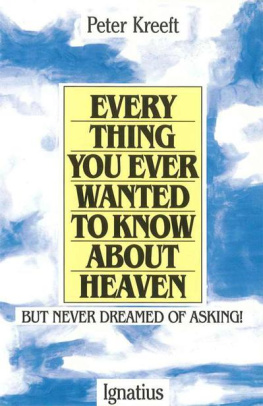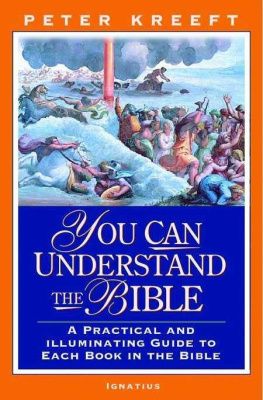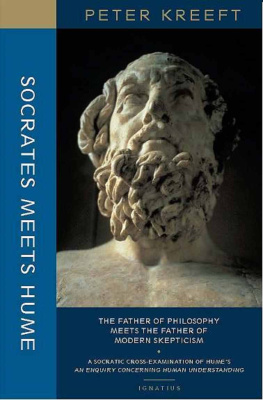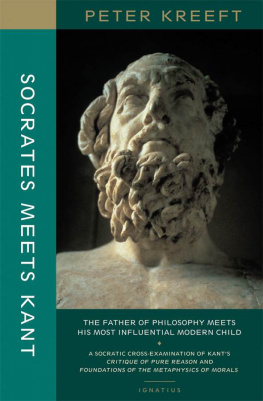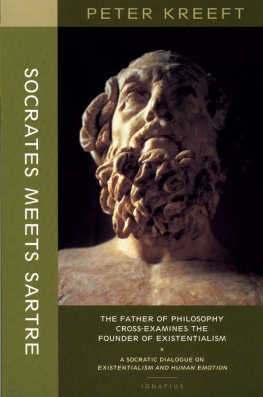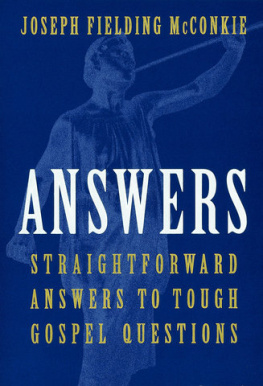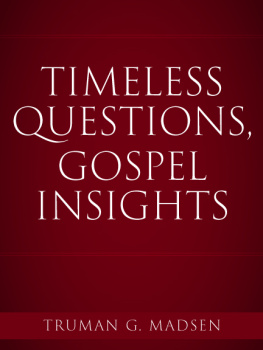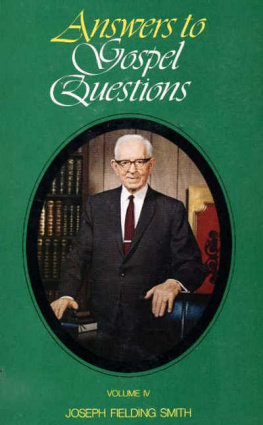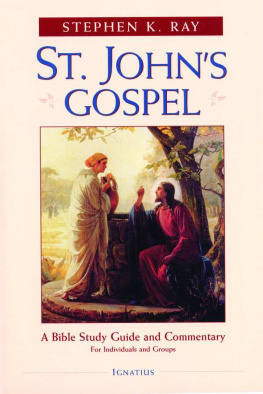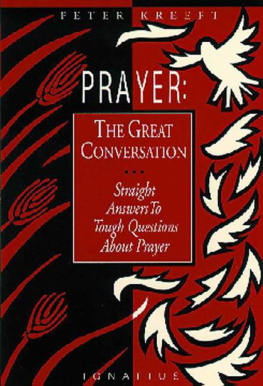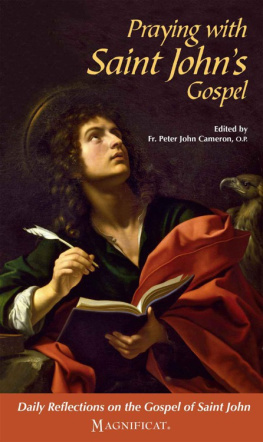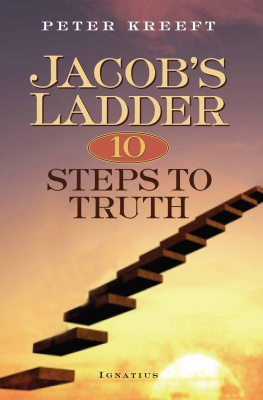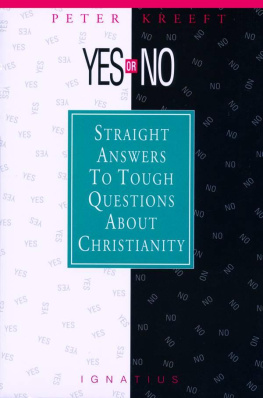Probes
Peter Kreeft
Probes
Deep Sea Diving into Saint Johns Gospel:
Questions for Individual or Group Study
IGNATIUS PRESS SAN FRANCISCO
The Scripture contained herein is from the RevisedStandard Version of the BibleSecond Catholic Edition(Ignatius Edition). Copyright 2006 by the National Council of the Churches of Christ in the United States of America. All rights reserved worldwide.
Cover photo istock/Jay_Zynism
Cover design by Enrique J. Aguilar
2019 by Ignatius Press, San Francisco
All rights reserved
ISBN 978-1-62164-156-8 (PB)
ISBN 978-1-64229-088-2 (EB)
Library of Congress Control Number 2019931773
Printed in the United States of America
Contents
Introduction
We live in a culture in which religion is supposed to be declining. Yet spontaneously arising, lay-organized Bible studies are multiplying like rabbits, in all denominations, especially among Catholics. Here is some rabbit food.
It is not an agenda for denominational proselytizing or sheep-stealing. In the course of exploring passages of Scripture that have occasioned disagreements in the past, some of the theological issues that have divided the churches will naturally arise (issues like baptism, the Eucharist, and authority); but this book does not settle them. It is usable by all believing Christians and by interested agnostics, too. (Why not?)
There is no good reason why Catholics, Anglicans, Eastern Orthodox, and Protestants, and different denominations of Protestants, should not study the Bible together. And there are many good reasons why they should. It is their common foundation and source; and returning to that common trunk together is bound to lead to greater mutual understanding and unity among all the different branches of Christendom.

A book should always reveal its assumptions, the point of view from which it is written. Mine is twofold: (1) the truth of the historic Christian faith and (2) the infinite depths and riches of Scripture, which endlessly rewards endless explorations, or probes.
Because (2) is true, reading and rereading each verse slowly,carefully, thoughtfully, and prayerfully before trying to answer thequestions that make up the content of this book is extremely valuable. It is the essentialdifference-maker between success and failure in Bible study. If you dothis, I guarantee that you will not emerge unchanged from yourencounter with the Word of God on paper, any more than anyone everemerged unchanged from his encounter with the Word of God in theflesh. Scripture calls itself the sword of the Spirit (Eph6:17). Swords make a difference: they cut into you. Scripture is a two-edged sword (Heb 4:12) that actually does something, changes something, cleaves bone from sinew, soul from spirit, head from heart.
This book is nearly worthless in itself. Its whole worth consists in helping you to probe into Johns Gospel. Please do not try to read it by itself, as you would read another book. It is a means, not an end; a telescope, not a star; a polishing cloth, not a jewel; an ugly piece of dirty paper money, not the beautiful things you can buy with it. After you read this introduction, do not read another word of this book without having a Bible open. Insofar as this book calls attention to itself, it fails; only insofar as it calls your attention back to the passages in the Bible that it probes and asks questions about does it work.
Do not treat it as a book of puzzles and the Bible as a book of answers to the puzzles. Treat it as a series of loving investigations or probes into the mind of your beloved Lord, a kind of spiritual lovemaking with the Word of God, which is primarily Christ himself and secondarily his inspired book.

The probes referred to in my title are questions that you areinvited actually to raise in dialogue with this greatest of books. Forthis book is not just a book; it is an instrument of a Person whotalks back to you when you read it. The Bible is like ajack-in-the-box, and Jesus is the jack who jumps out. Warning: Whenyou read this book (the Bible, not my book!) in the right way, youmight see a Face looking back. Questioning it is really questioninghim. (For both Scripture and Christ are called the Word of God.)And whenever we question him, his answer is usually a question to usin return. It is much more comfortable for us to question than to bequestioned, as it is more comfortable to look at someone else than tohave someone else look at you. When you read the Bible, you do notlook into a mirror, at yourself, or at a famous old painting of a manlong dead; you look through a window, where Someone Else is watchingyou watching him. You dont see the hand of the Spirit who wields thissword or scalpel, but you often feel it, and you feel its sharpeffects when it cuts through the skin of your heart and the bones ofyour mind. Bibles should come with warning labels, seat belts, andlife jackets.

This book consists entirely of questions (probes). Why?
- Because asking questions is the primary way to learn. Thats one simple and obvious reason why children learn more, and faster, than adults do: because they never stop asking questions.
- Because figuring out the answer yourself is much better than listening to somebody else (a preacher or teacher) do it for you. What you discover by your own thinking becomes yours more truly and more permanently than what you are given by others.
- Because questioning yourself and your life is one of the very best things you can ever do. It means that you are being honest and open-minded and in search of truth, which is the food for the soul.
- Because Jesus never discouraged a question, no matter how foolish.
- Because whenever God shows up, he asks us a question, or at least gives us a challenge or a command or a task. It forces us to respond, not just to sit and be entertained. Even not-responding is a response. No one was ever allowed to be passive around Jesus. No one should be allowed to be passive in this Bible study, which is about Jesus.

This is not a quiz book or a book of tests, and there are no answer keys. So please do not say to me, Youve written a book of almost 1500 questions; may we please now have a book of the answers? No, you may not. That is not to say that there are no answers. There are. There is objective truth in religion as much as in science or in common sense (though these three methods for finding truth are different). But many of these questions have not just one right answer, but many. For most of these questions are not merely about facts but about understanding. They are stimuli to make your grey matter move; they are probes. You cant look up the answers in another book or on the Internet. You must look for the answers with your own mind.
This is not a work of scholarship. I deliberately did not read any scholarly commentaries on Johns Gospel when writing this book because I did not mean it to be a textbook for a theology course or an original contribution to scholarly biblical theology. I got all these questions from my own Christian experience and thinking, not anyone elses, and you are expected to answer them from your own experience and thinking, not anyone elses.
Next page


